It’s hard not to notice the frequency and amount of your dog’s bowel movements when you’re the one cleaning up after them.
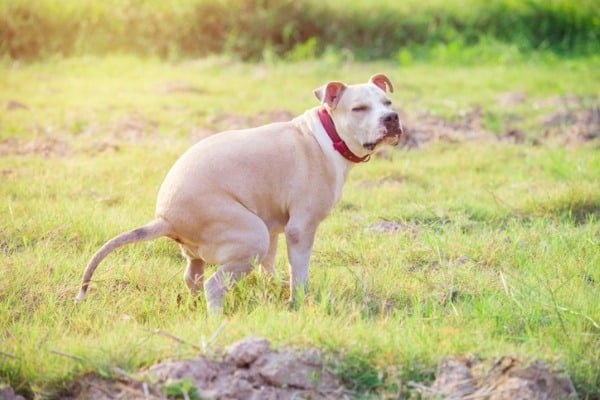
We understand!
Healthy dogs can be expected to poop one to five times a day, with most dogs landing in the middle of that range.
A dog pooping excessively by human standards is probably perfectly fine, but how much is too much?
How do you recognize normal amounts versus volumes that indicate an issue?
You’re in luck:
If you’re worried about how much your dog poops – as long as it’s not diarrhea, the odds are that something isn’t dangerously wrong.
In this article, we’ll go into more in-depth detail about how often and how much your dog can be expected to need the bathroom, what else to look out for, and when to consult the vet.
How Much is Too Much?
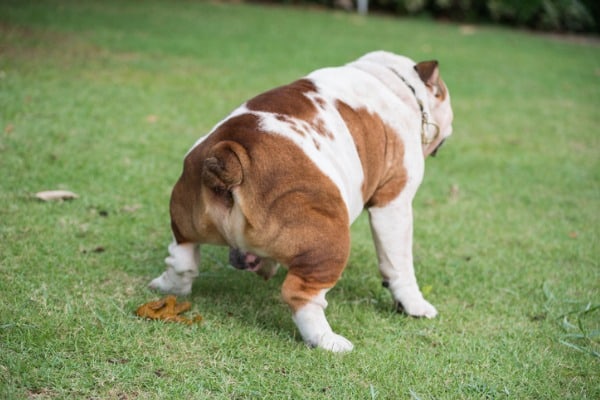
There is no one-size-fits-all answer to how much your dog should poop, even within the same breed or size range.
How often do big dogs poop?
What about little dogs?
Their breed has little to no effect on the frequency of their poop habits.
It’s the amount that varies between different-sized dogs.
Toy breeds will produce much smaller bowel movements, while large and giant breed dogs can leave behind poops that take two waste disposal bags to clean up.
Their diet and exercise habits can also affect how much and how often your dog poops.
If your dog’s pooping habits are on the lower or higher end of the range, it can also simply be in their nature.
Dogs should go at least once a day – failing to do so is an indicator that they’re constipated.
Going more than five times a day usually points towards something being off in their lifestyle.
A dog who poops a lot more than average is being affected by something in their environment or an underlying health issue.
What Can Cause Excessive Pooping?
A dog who has diarrhea or loose stools will more than likely need to go to the bathroom more than usual.
Many things can cause diarrhea – some scenarios require your dog to be evaluated by the vet.
This includes even if your dog is having diarrhea but they are acting fine.
Parasites
Intestinal irritation caused by parasites – anything from roundworms to coccidia – is liable to cause abnormal stools.
You might notice your dog’s poop is softer or loose, and it can progress into diarrhea.
Parasites can also increase the number of times your dog needs to relieve themselves on a daily basis.
Infestations of parasites have to be treated before your dog’s health will return to normal.
The deworming medication itself can cause some temporary excessive bowel movements.
This is normal and necessary to purge the parasites from your dog’s system.
Preventive medications are the best way to solve this excessive pooping issue.
Irritable Bowel Syndrome (IBS)

IBS can strike canines, too. It produces the same symptoms that it does in humans, including sudden urges to go to the bathroom and increased frequency in bowel movements.
Irritable bowel syndrome can also cause bouts of constipation.
If your dog’s bowel habits seem to be flip-flopping between going too much and not going enough, they should be tested for IBS.
There’s a solution:
IBS symptoms can be treated and managed with the help of a vet.
Some cases of IBS will need to be treated for the lifetime of your dog, but they can still have an excellent quality of life with proper medications.
Unknown Health Issues
Excessive pooping – especially if the poop is bloody, loose to runny, or contains mucus – can indicate a serious health problem.
Seek professional help:
These symptoms should be discussed with your vet, who will determine what tests your dog needs to diagnose the problem.
It can be anything from allergies to liver disease causing these types of symptoms, which is why it’s crucial to address them as soon as you notice.
The sooner your dog can be diagnosed, the quicker they can begin a treatment plan that gets their health back on track.
Sudden Diet Change
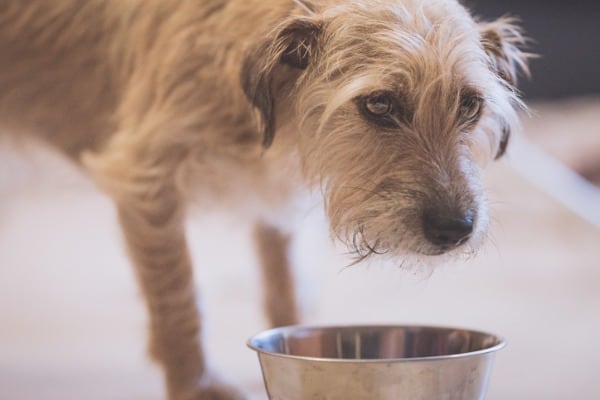
Too fast of a transition to a new food can irritate a dog’s stomach and bowels.
The first sign your dog’s food was switched too quickly is that they will start scratching at the door to go out more than usual.
You need to work in stages:
Shifting from one food to another too fast disrupts the good bacterial colonies in your dog’s stomach and allows the “bad” bacteria to grow out of control.
While this eventually leads to diarrhea, it can begin as several normal to loose stools that occur in a shorter time frame than usual.
It can take a Flagyl prescription and several days to get your dog’s bowels back in balance.
To avoid this problem, slowly integrate new food into your dog’s diet, preferably over the span of 10-14 days.
Scavenging
We’d like to meet a pet parent who has managed to keep their dog out of the trash or cabinets from day one.
No matter how hard we try, dogs usually get into something they ought not to at least once in their lives.
It’s normal:
Sometimes it’s the garbage, leftovers, or some unknown atrocity they snatched up in the yard before you could catch them.
In other cases, dogs will scavenge the entire countertop for anything and everything they can find.
We’ve dealt with dogs who helped themselves to a whole loaf of bread and then washed it down with an entire stick of butter.
Who wouldn’t need the bathroom after that?
Eating more than usual is more than enough to trigger extra and bigger bowel movements.
Throw in the fact that whatever they ate is harder on their stomach than their dog food, and you have a recipe for extra pooping.
Super-scavengers – that is, dogs who will gobble up all kinds of terrible things with lightning speed – can require serious measures to curb the behavior.
Training the “leave it” command is the best option for keeping your dog from eating bad things.
On the subject of doo-doo, check out how to get your dog to stop eating poop, should you be so lucky to have this kind of problem!
It can be helpful to have a backup until you and your dog have fully mastered the command.
Some pet parents choose to muzzle-train their dogs for walks, so they don’t have a chance to eat things they shouldn’t.
Muzzles have a bad reputation, and many associate them with poorly behaved or aggressive dogs.
When used properly, they can be a valuable training tool that is less restrictive than other options.
Remember:
It’s a much better alternative to your dog ingesting something that upsets their stomach or poisons them.
Dogs can be desensitized to wearing a muzzle.
As long as it’s not on while your dog is unsupervised or for long periods, it doesn’t pose any risks to them.
Basket muzzles are best and don’t restrict normal breathing and panting but prevent your dog from picking up undesirable foods.
As for food in the house, vigilance is the key to keeping your dog from eating your groceries.
Blocking them off from the kitchen is easiest, either by using a baby gate or crating your dog while they’re unattended.
It might be worth it to invest in a dog-proof garbage can but be warned: some dogs are clever enough to work their way around them.
The less opportunity your dog has to scavenge, the healthier their poops will be.
Too Much Dog Food
Sticking to dog food and staying out of the fridge usually helps a dog who poops too much.
However, eating their own food can sometimes be enough to cause extra pooping.
Make sure your dog is getting the recommended amount of food based on their age, weight, and exercise.
Excessive pooping caused by too much food will also lead to obesity if your dog’s diet isn’t adjusted.
Too Much Fiber
Reputable brands of dog food are typically good at providing balanced nutrition for your dog.
Bargain-basement dog foods and raw diets can sometimes cause your dog to get too little or too much of something, like fiber.
If you share human foods with your dog:
Things like pumpkin, squash, carrots, apples, and broccoli are examples of things that have lots of fiber.
While these foods in certain amounts are good for your dog, you don’t want to overfeed them.
If you make your own dog food, and you notice your dog is pooping more than usual, you should try dialing back the fiber-rich foods in the meal.
Multiple Meals
It’s good to spread your dog’s food over 2-3 meals a day.
It will help encourage healthy bowel habits, reduce the risk of bloat, and decrease symptoms like upset stomach and vomiting bile.
Picture this:
A dog who eats several times a day may be pooping more often than a dog who eats all their daily food allowance in one meal.
Extra treats, chewies, and table scraps can increase how often and how much they poop.
Excess Pooping – Can it be Behavioral?
Sometimes extra pooping has no clear cause.
Your dog can be on an ideal diet, have a clean bill of health from the vet, and still be pooping at an alarming rate.
Why is this?
We’ll go over the common causes next.
Why Does My Dog Poop So Much on Walks?
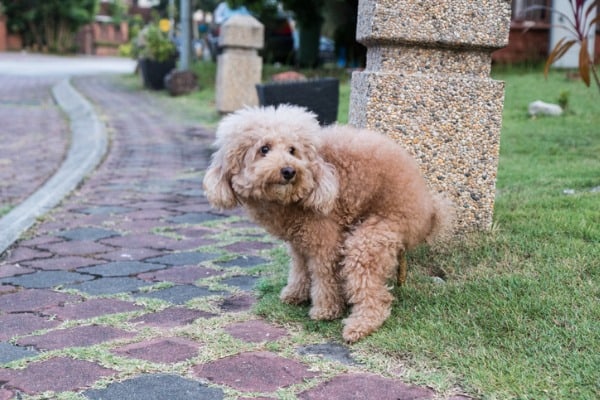
They might be trying to mark their territory with their scent.
Similar to the way male dogs lift their leg on innocent lamp posts and trees, a dog might leave a more solid gift behind to “claim” their property.
At least what they think is their property.
Dogs have scent glands that produce an odor that acts as a message to other dogs.
Besides peeing on things, leaving poop covered in that odor is an effective means to deliver that message.
You might be surprised at how often your dog can leave this calling card behind on one walk.
While they aren’t likely to leave a full bowel movement on everything they wish to mark, they are capable of producing more than many pet parents expect.
Scent marking indoors is not acceptable behavior, and dogs can be trained not to do it, but they’re more likely to try outdoors.
This behavior outside is natural and ingrained into the instinct of dogs, albeit some more than others.
We don’t know precisely why some dogs are more prone to this behavior, although there is some evidence that it’s more common in male dogs.
We don’t recommend discouraging it since it’s so hardwired into your dog’s brain and rarely causes any serious issues.
Training them out of it would be akin to trying to train your dog out of licking their own butts.
At worst:
You’ll need to come armed with extra poop bags or be prepared to do a little more work with the pooper scooper.
Why Does My Dog Poop So Much at Night?
Evening pooping can be correlated with pooping a lot on walks – many of us take our dogs on their long walk later in the day.
If your dog has one mealtime in the evenings or they eat a bigger meal at night, this can also contribute to more and bigger poops at night.
If we’re talking about a puppy in this scenario, there is a very simple explanation for pooping at night.
Puppies cannot hold their bladder or bowels overnight the same way adult dogs can.
The vast majority of puppies cannot go all night without a bathroom break until they are at least six months old.
Even by that age, your puppy might need at least one break in the middle of the night until they’re closer to a year old.
Puppies pooping in the middle of the night don’t typically do it because of health issues. Unless they have abnormal symptoms behind pooping in their sleep, this is nothing to be alarmed about.
Elderly dogs might need similar midnight potty breaks because their bodies aren’t as great at holding their bladder and bowels once they become geriatric.
Why Does My Dog Poop So Much on Vacation?
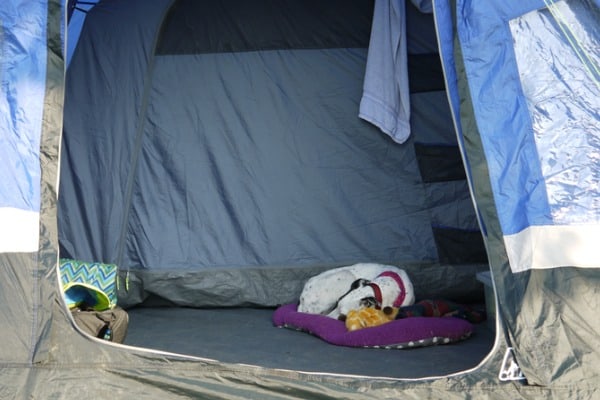
Any change in routine can cause stress for dogs. Some are very sensitive to a change in routine, and others take it in their stride.
Dogs who are nervous travelers might poop out of sheer nervousness.
So if your camping trip turns into a seemingly nonstop cleanup of dog poo, you probably have a stressed-out dog on your hands.
Car and air travel can also upset your dog’s stomach, causing them to vomit or poop extra.
Calming them down by providing familiar things can help reduce their stress.
So when you pack for your trip, remember your dog’s bed, blankets, dishes, or favorite toy.
Also, try to get back to their regular routine as soon as possible.
Feed them at normal times, give them plenty of attention, and if they’re clingy – let them be clingy.
You’re probably their biggest comfort under stress.
Poop Happens
Let’s face facts; poop and lots of it is a normal part of raising a dog.
It takes a lot of extra poop for it to be considered an abnormal thing, as well as other symptoms that you’re not likely to miss.
You might be amazed at how much your dog can hold.
Does your backyard seem to fill up with dog poop? Check out how to dissolve excessive dog poop in your yard if you want to get a handle on this problem.
Ask yourself a few things if you’re concerned about those large bowel movements: is it loose, runny, or discolored? Does it contain blood, mucus, or signs of parasites?
Is your dog straining to go or showing signs of pain or discomfort?
As long as you can answer no to those things, there is no cause for panic.
If you think your otherwise healthy dog poops too much, bring it up with your vet.
They are the best person to tell you how much is too much based on your dog’s health history, size, and age.
Just remember it’s natural for dogs to poop a lot – more than you might guess – and keep your doggie doo bags handy.
